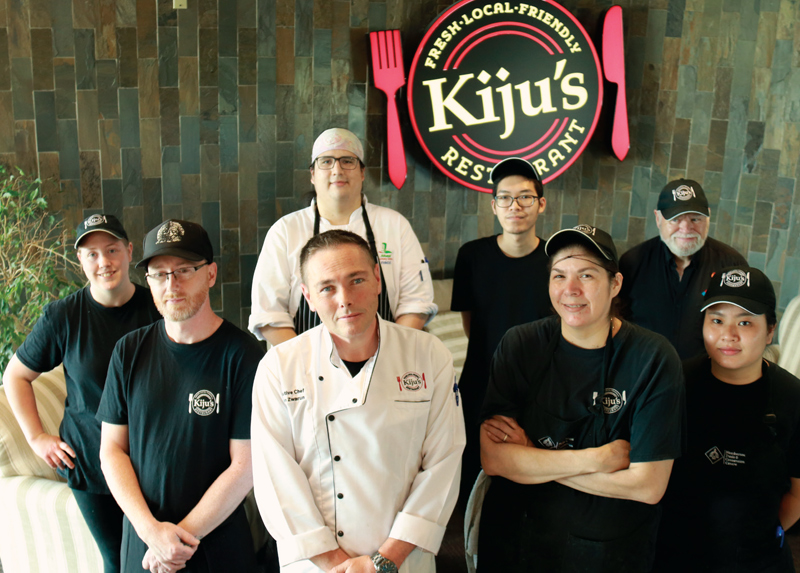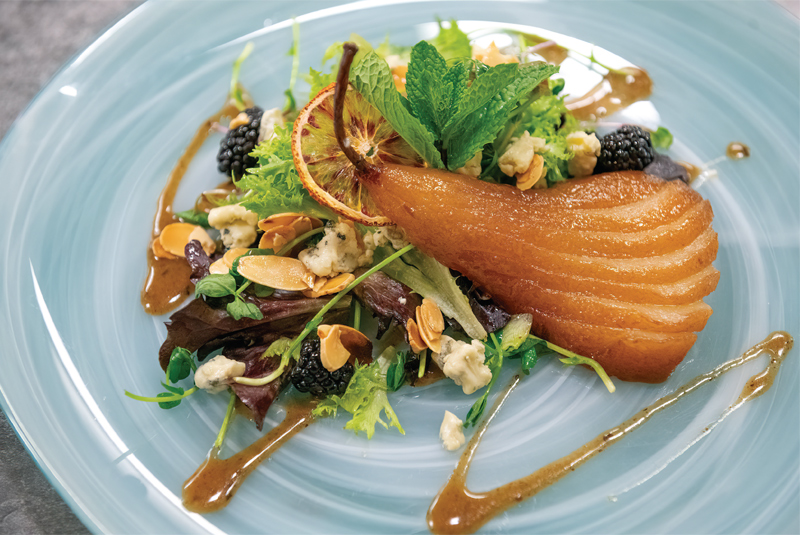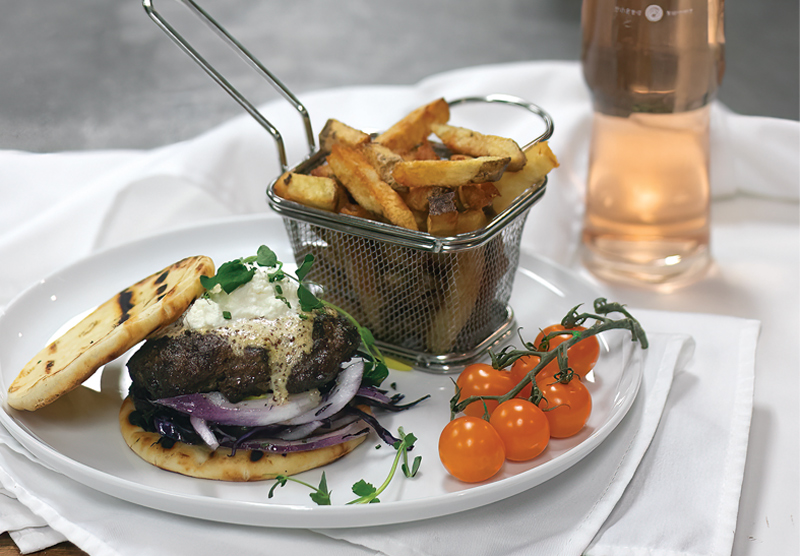Account Login
Don't have an account? Create One

At Kiju’s Restaurant in Membertou, Nova Scotia, chef Shaun Zwarun creates menus that use local ingredients, but more than that are inspired by them and the local enterprises making up the food industry ecosystem in Nova Scotia.
Zwarun has contributed to cookbooks in the past but the first book of his own — Fresh, Local and Delicious: Dishes from Mi’kma’ki and around the world from Kiju’s Restaurant in Membertou — has just been released by Formac Publishing. It features a collection of recipes from Zwarun’s decade-plus at Kiju’s. In his foreword, the chef makes a point to credit suppliers and expressly names 28 different companies in the intro text. Speaking with Atlantic Business Magazine, he insisted they and more have collectively been essential to his work over the years, since his return from restaurants in Prince Edward Island to his childhood home of Cape Breton.
Contacted in PEI and offered the job of leading at Kiju’s, one of the first things Zwarun did was reach out to other chefs in Cape Breton. Everyone knows the big food suppliers, he explained, but it was important to also connect with local, independent farms and micro suppliers.
“If you’re looking for local sea salt or local lamb, those types of things, it definitely helps to talk to people who have been around for a little while,” he said.
Zwarun instantly found the local ecosystem — the number of produce, fish and meat suppliers, small-scale processors and even connections between companies — had matured since his time at the Nova Scotia Community College Culinary Arts program in Sydney back in the early 1990s.
He made a few instant connections, building more through the years. As an aid for anyone similarly interested in developing ties with local suppliers in Nova Scotia, Zwarun plugged the Cape Breton Food Hub (launched in 2015), with its online platform and direct delivery to the door. He said the hub makes buying local from more than 50 suppliers that much easier, versus communicating individually with companies. Deeper relationships can still develop over time. He said the restaurant is also a member of Taste of Nova Scotia, an organization touting over 200 suppliers in its membership and through which he has made discoveries.
Zwarun’s appreciation for local comes through on the plates in Kiju’s dining room but also in his now-printed recipes, down to names like “Sea Fever Rum Lacquer,” making use of spiced rum from the Sea Fever distillery on Guysborough Harbour, or “Horyl’s Pepperoni Corndog with Maple Mustard Aioli,” in a nod to Horyl’s Superior Sausage Company, operating for nearly a century from its base in River Ryan, Cape Breton.
If not in a recipe name, the chef will often namedrop in his ingredients lists or within notes alongside recipes, like a note included on his preference for using gouda from That Dutchman’s Cheese Farm based in Upper Economy, Nova Scotia, in his gouda fritters with maple syrup, typically served alongside a curried sweet potato soup.

The message throughout is it takes a village (really, multiple villages) to produce the many, local ingredients Zwarun’s kitchen puts to use. And the chef offers respect for each supplier, their processes and challenges they face in getting prime ingredients out the door. In the end, including a name or two, he suggested, was an easy thing.
Farmers, fromagers, distillers: “It’s their product that we’re highlighting,” Zwarun said.
“It takes so many different people to make the end product and without that specific product I wouldn’t be able to create that specific dish.”
Local suppliers offer a fresh product. That’s a cliché but also a truth. But the chef also explicitly likes the products from local suppliers he puts to use.
“The more these small businesses grow, the better it is for us,” he said.
Apart from company names, there are nods to local geography, as in naming his “Steamed Aspy Bay Mussels with a Sambucha Chive Reduction,” in reference to a bay in northern Cape Breton, or a reference to the “strawberry run,” as some anglers refer to the place of an annual run of sea trout, when strawberry blossoms dot the riverbanks.
A little of Zwarun’s personal history, from growing up in Glace Bay and traveling Nova Scotia, also shines through. For example, his recipe for “Pan Fried Fisher’s Pond Smelts with a Sweet Pepper-Star Anise Chow,” mentions his father (an immigrant from Ukraine who worked in the Glace Bay coal mines) who cooked smelts for Zwarun as a boy.

When first making the decision to move home from PEI, Zwarun says he was drawn by the fact he would be working in the anchor restaurant for the Membertou Trade and Convention Centre. “Membertou is a vibrant community and has grown into one of the most progressive thinking and influential Indigenous communities in the country,” he writes, specifically thanking Chief Terrence Paul and the Membertou Band Council for the initial opportunity and support through the years, along with offering similar respect to the council in interview.
Zwarun is not Indigenous and doesn’t promote his book based on any Indigenous ties. However, he said, he has tried to be respectful in developing the menus at Kiju’s, with his love of local extending to ingredients common to Mi’kmaq homes. There are also recipes developed with Indigenous restaurant staff through the years, including the “Three Sisters Succotash” that pairs with pan-seared halibut and a shellfish paella. The Three Sisters is a trio of local beans, corn and squash traditionally grown by many Mi’kmaq families.
Over the years, Zwarun has found inspiration as well in working with international students coming from Cape Breton University, as in the recipe for “Sichuan Pork Belly with Star Anise and Napa Chili Slaw” developed after experiments with Sichuan food with a colleague, Siyu, originally from China. In an expected nod to local ingredients, he mentions the dish is typically made for Kiju Restaurant customers using heritage breed pork from Katherine Farm, a family farm in Roberta, Cape Breton.
Zwarun is all-in on Nova Scotia producers but said the recipes in his book are a guide rather than hard and fast rules. A specific Nova Scotia cider, for instance, can be switched out for your own local. At the end of the day, being able to mix it up a little, to try new things: “That’s the fun of cooking,” he said.
Even so, he pushed, if nothing else, looking specifically for locally produced options and finding inspiration there.
In Book Report, Atlantic Business Magazine highlights non-fiction focused on Atlantic Canada and Atlantic Canadians, and from Atlantic Canadian publishers. These short pieces will offer details from upcoming business biographies, Q&As on new releases and in some cases fresh commentary from non-fiction authors on the subject of their published works.
Comment policy
Comments are moderated to ensure thoughtful and respectful conversations. First and last names will appear with each submission; anonymous comments and pseudonyms will not be permitted.
By submitting a comment, you accept that Atlantic Business Magazine has the right to reproduce and publish that comment in whole or in part, in any manner it chooses. Publication of a comment does not constitute endorsement of that comment. We reserve the right to close comments at any time.
Cancel